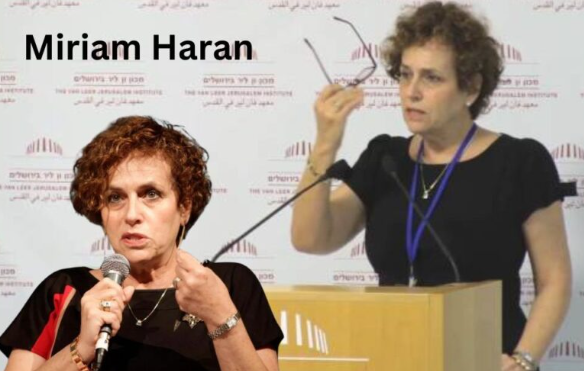Environmental sustainability is a crucial issue facing the world today. One influential figure in this field is Miriam Haran, a recognized leader in environmental science, policy-making, and sustainable innovation. Her contributions have shaped the way governments and organizations approach environmental challenges, making her a key figure in promoting sustainable development.
This article provides an in-depth look at Miriam Haran’s work, exploring her contributions to environmental policy, her influence on corporate sustainability, and her role in advancing green innovation. We’ll also examine her leadership in various governmental and non-governmental organizations, the impact of her efforts, and the practical applications of her work in real-world scenarios.
Who is Miriam Haran?
Miriam Haran is a respected environmental scientist and policymaker known for her expertise in sustainable development and environmental governance. She has held several influential positions in both government and academia, most notably serving as the Director General of Israel’s Ministry of Environmental Protection. Through her leadership, she has significantly contributed to environmental legislation, emphasizing pollution reduction, climate change mitigation, and sustainable innovation.
Educational Background and Early Career
Miriam Haran’s academic journey began with a strong focus on science. She earned her Ph.D. in Chemistry from Hebrew University of Jerusalem, laying a solid foundation for her later work in environmental protection. Her early career included both research and teaching roles, where she gained valuable insights into environmental issues, including air and water pollution. This scientific background enabled her to approach policy-making from an evidence-based perspective, ensuring that her decisions were grounded in research.
Miriam Haran’s Role in Environmental Policy
As the Director General of Israel’s Ministry of Environmental Protection, Miriam Haran played a crucial role in shaping environmental policy in Israel. She was instrumental in advancing legislation that focused on reducing pollution levels, particularly in industrial areas. One of her most notable achievements was leading initiatives to implement stricter regulations on air and water quality standards.
Under her leadership, the Ministry introduced several important laws, including regulations on hazardous waste disposal, renewable energy development, and conservation of natural resources. Haran’s focus on sustainable development helped Israel make significant strides in becoming a greener nation.
Key Contributions to Corporate Sustainability
Miriam Haran also made a lasting impact on corporate sustainability, emphasizing the role of businesses in environmental protection. She worked closely with the private sector to encourage corporate social responsibility (CSR) initiatives that align with sustainable practices. Haran’s policies pushed corporations to adopt eco-friendly practices, such as reducing their carbon footprints, improving waste management, and developing sustainable supply chains.
One of her major efforts included collaborating with multinational corporations to implement environmental management systems (EMS), ensuring that businesses adhered to environmental laws and actively sought ways to reduce their environmental impact. Her advocacy for green innovation in business paved the way for many companies to embrace sustainability as a core part of their operations.
Environmental Innovation: Miriam Haran’s Approach
Haran’s approach to environmental innovation is one of her most defining characteristics. She believes that technological innovation is essential to addressing environmental challenges. Her support for green technologies, such as renewable energy, waste-to-energy solutions, and sustainable agriculture, has helped accelerate the development and deployment of technologies that reduce environmental damage.
By advocating for clean technology, Haran has promoted the integration of solar energy, wind power, and biotechnology into mainstream environmental practices. Her work has also highlighted the need for innovation in water management, particularly in areas facing severe water shortages.
Influence on Israeli Environmental Policy
Haran’s influence on Israeli environmental policy is profound. She was behind several critical legislative measures that improved environmental oversight and accountability. Her focus on environmental justice ensured that disadvantaged communities were protected from industrial pollution and environmental degradation.
Through her initiatives, Israel saw a reduction in industrial emissions, improved water quality, and increased investment in renewable energy. Miriam Haran’s ability to work across party lines allowed her to push through policies that prioritized long-term sustainability over short-term gains.
Global Impact and International Collaborations
Miriam Haran’s work extended beyond Israel. She has collaborated with international organizations such as the United Nations Environment Programme (UNEP) and the World Health Organization (WHO) to address global environmental challenges. Her expertise in policy-making and environmental governance has been sought after by various countries looking to implement effective environmental laws.
Haran’s focus on climate change and global pollution has earned her recognition as a thought leader in environmental diplomacy. By fostering international cooperation, she has helped create a unified approach to tackling cross-border environmental issues like air pollution and marine conservation.
Notable Challenges in Environmental Governance
Environmental governance is fraught with challenges, and Haran’s career has not been without obstacles. One of the major challenges she faced was the balancing act between economic development and environmental preservation. Industrial sectors often resist regulations that might limit their productivity, creating tension between policymakers and businesses.
Another challenge was the slow pace of implementation of environmental laws. While policies were passed, enforcement often lagged, particularly in sectors resistant to change. Haran recognized this gap and worked tirelessly to strengthen enforcement mechanisms and increase accountability.
Solutions and Strategies by Miriam Haran
To overcome these challenges, Miriam Haran employed a combination of policy reform and public engagement. She believed in the importance of educating the public about environmental issues, creating awareness campaigns to garner public support for stricter environmental regulations.
Haran also advocated for stronger penalties for companies that violated environmental laws, coupled with incentives for those that adopted sustainable practices. Her strategy included a collaborative approach, engaging stakeholders from industry, government, and civil society to develop policies that were both effective and feasible.
Practical Applications of Sustainable Policies
Miriam Haran’s sustainable policies have had practical applications across various sectors. In agriculture, her support for organic farming and water-saving technologies has led to more sustainable food production methods. In the energy sector, Haran’s emphasis on renewable energy has spurred investment in solar farms and wind turbines, significantly reducing Israel’s reliance on fossil fuels.
In urban planning, Haran’s push for green infrastructure has led to the development of eco-friendly buildings and public spaces that use less energy and produce less waste. Her policies have also encouraged the development of sustainable transportation, including electric vehicles and bike-sharing systems, reducing the carbon footprint of cities.
The Future of Environmental Sustainability
Looking to the future, Miriam Haran continues to advocate for bold environmental policies. She emphasizes the importance of addressing climate change, calling for deeper cuts in greenhouse gas emissions and greater investment in green technologies. Haran remains a vocal supporter of international climate agreements, arguing that global cooperation is key to solving the environmental challenges of the 21st century.
As the world grapples with increasingly severe environmental crises, Haran’s leadership and expertise will continue to be invaluable. Her commitment to sustainability serves as a model for future policymakers, scientists, and business leaders.
Awards and Recognition
Miriam Haran’s contributions have earned her numerous awards and recognition. She has been honored for her leadership in environmental science and policy, receiving accolades from academic institutions, governments, and international organizations. Her awards highlight her dedication to promoting sustainable development and her tireless efforts to protect the environment for future generations.
Miriam Haran’s Legacy
Miriam Haran’s legacy is one of commitment to the environment and sustainable development. Her work has influenced countless individuals, organizations, and governments to take action in protecting the planet. Through her policies, research, and advocacy, Haran has helped shape a more sustainable world.
Her legacy will continue to inspire future generations of environmental leaders, ensuring that her vision for a greener, more sustainable future lives on.
Miriam Haran in Academia and Research
In addition to her policy work, Miriam Haran remains active in academia. She has published numerous research papers on environmental science, sustainability, and climate change. Haran continues to contribute to the academic community, mentoring students and young professionals interested in environmental issues.
Her academic work complements her policy efforts, providing a research-based foundation for her initiatives and ensuring that her policies are grounded in scientific evidence.
Frequently Asked Questions (FAQs)
1. What are Miriam Haran’s most significant contributions to environmental policy?
Miriam Haran has significantly influenced air and water quality regulations, promoted renewable energy, and advanced corporate sustainability in Israel.
2. How did Miriam Haran contribute to corporate sustainability?
She pushed for the adoption of environmental management systems and encouraged businesses to reduce their carbon footprints through eco-friendly practices.
3. What challenges did Miriam Haran face in environmental governance?
She encountered resistance from industrial sectors and slow enforcement of environmental regulations, which she addressed through public engagement and stronger enforcement mechanisms.
4. What are the practical applications of Miriam Haran’s policies?
Her policies have been applied in agriculture, urban planning, and energy sectors, leading to advancements in organic farming, green infrastructure, and renewable energy.
5. What is Miriam Haran’s ongoing impact on global environmental policy?
Haran continues to collaborate with international organizations to address global environmental challenges, emphasizing climate change and pollution reduction. For more info visit Techno Buzz.

